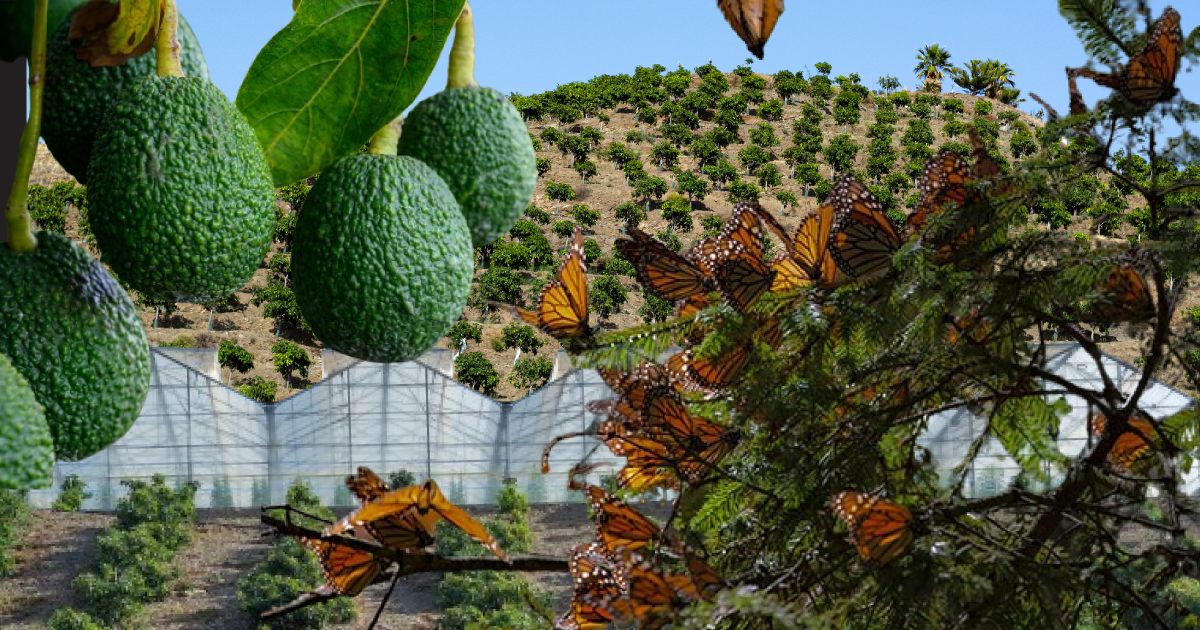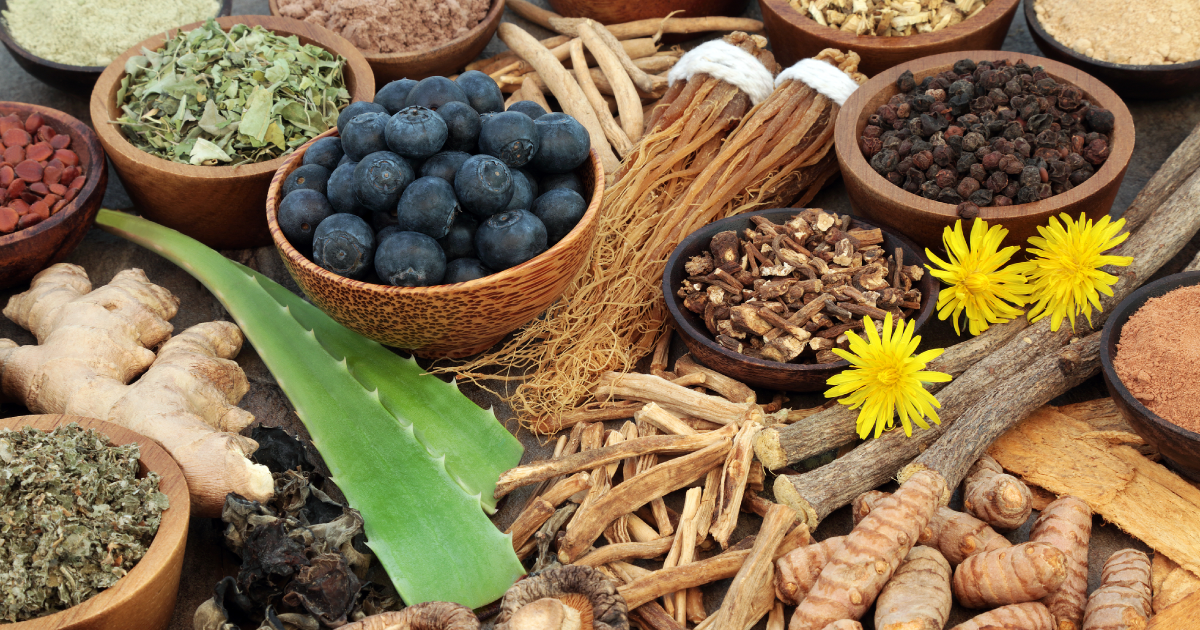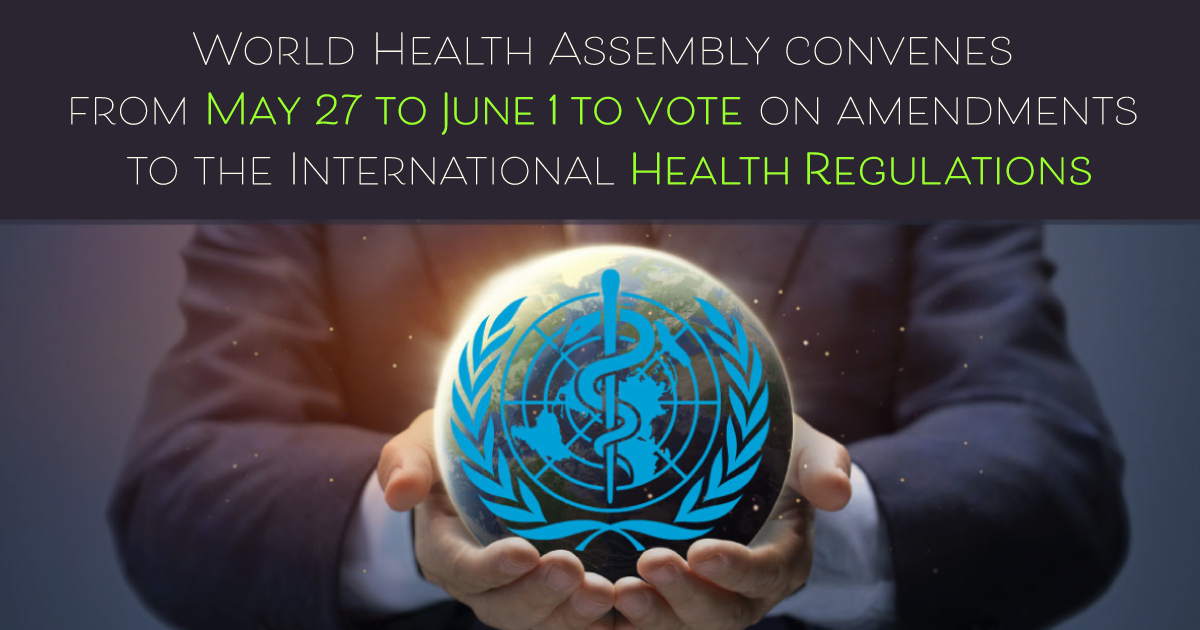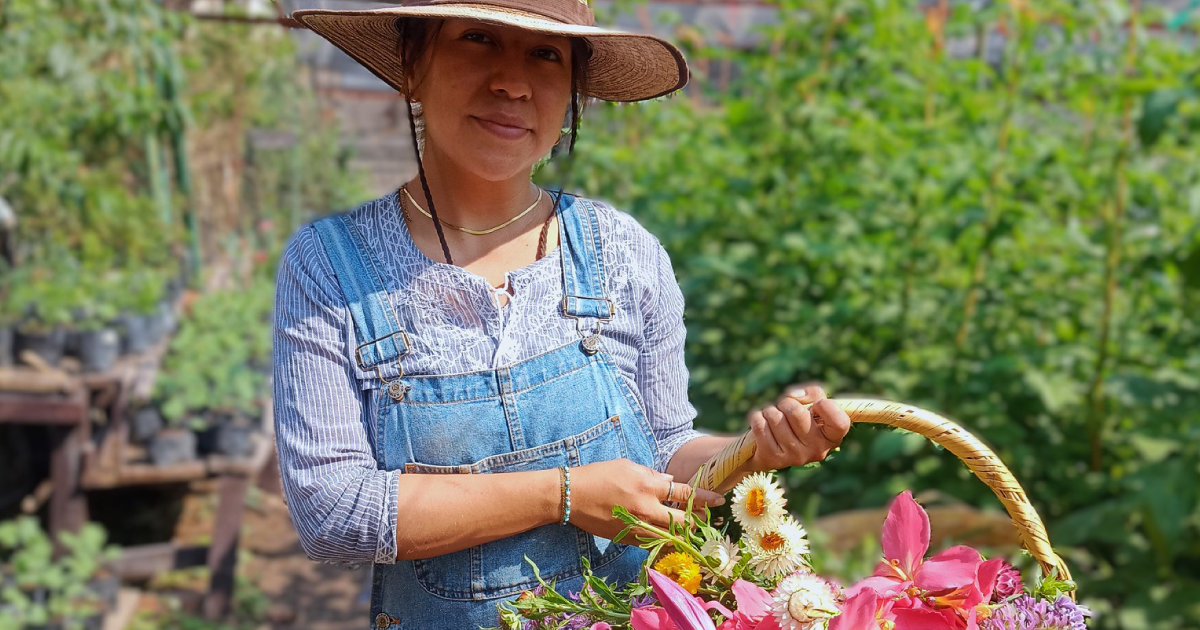
BUY ORGANIC & FAIR TRADE
Wholly Guacamole: Stop Deforestation!
If your avocado isn’t organic and fair trade (or from California)…
It came from land that was recently, probably illegally, deforested, land that was stolen or cleared in an act of arson, or land that was stripped of its oyamel fir trees, the winter roosts of monarch butterflies.
It was irrigated with water siphoned without a permit away from the local community that now can’t grow their own food or bathe and have to buy water, even to drink, or abandon their land altogether.
It traveled a supply chain that involved cartels that extorted “protection money” from the avocado farm or the packer, or hijacked the truck that was taking it to market, or murdered the indigenous forest guardians who spoke out about the stolen land, the burned forest and the siphoned water.
When buying avocados, choose California-grown organic avocados and Mexican-grown organic and fair trade avocados.
Fair trade distributor Equal Exchange is doing what U.S. and Mexican regulators and every avocado business should be doing. They’re refusing to sell avocados from recently deforested land. They have an anti-deforestation policy that excludes farms that have been in operation for less than five years.
What else can we do?
Tell the rest of the avocado industry to follow Equal Exchange’s lead and stop buying avocados grown on deforested land.
The top way Americans eat avocados is in guacamole and the biggest guacamole brand is Wholly Guacamole, a joint venture of Hormel and MegaMex, part of Grupo KUO.
TAKE ACTION: Tell Wholly Guacamole to stop deforestation!
Read the New York Times’ “Americans Love Avocados. It’s Killing Mexico’s Forests.”

DR. JOSEPH MERCOLA
5 Nootropic Herbs to Supercharge Memory and Concentration
Analysis by Dr. Joseph Mercola:
“Story at-a-glance:
- Focus and concentration issues can significantly impact quality of life, affecting everything from daily routines to overall mental health
- Nootropic herbs are known for their ability to enhance cognitive function, including memory and concentration. Five notable nootropic herbs for enhancing cognitive function include Bacopa monnieri, Ginkgo biloba, Rhodiola rosea, Panax ginseng, and ashwagandha
- Elevated levels of serotonin have been linked to an increased risk of dementia in numerous studies. Another hazard is linoleic acid, which when consumed in excess can result in inefficient cellular energy production within the brain
- GABA’s role in the brain as a neurotransmitter helps in calming neural activity and can mitigate the harmful effects of too much linoleic acid and serotonin
- Nootropic herbs, GABA, and tailored lifestyle interventions can be incorporated as a comprehensive strategy to check cognitive decline and address both memory and concentration issues”
Read: 5 Potent Nootropic Herbs to Supercharge Memory and Concentration

FOOD & FARMING
In South Dakota, a Buffalo Herd Thrives in Cattle Country
Words by Grace Hussain, Sentient Media:
“Everytime Bamm Brewer kills a buffalo, he says a prayer thanking the animal for their sacrifice, and asking for protection. “Whenever you get there,” the prayer usually concludes, “can you carry a message to our relatives in the spirit world?” An Oglala Lakota living on the Pine Ridge Reservation, Brewer has been caring for the reservation’s buffalo herd in the southwestern corner of South Dakota for 30 years. In that time, the herd has nearly tripled in size, growing from 25 individual buffalo to, now, 70. For Brewer, the buffalo are not just a herd of animals, but a way to reclaim the health and culture of his people — a sharp contrast to the way cattle are treated on most industrial feedlots.
Life on Pine Ridge Reservation is difficult, by many measures. The average life expectancy on the reservation is only 66.8 years — the lowest in the country. The average income is under $9,000, and the official poverty rate tops 53 percent. Less than a third of residents have a high school diploma or GED, and the teenage suicide rate is 150 percent that of the country at large.
Brewer sees his herd of 70 buffalo as one solution to what his tribe faces today, all of which stem from a history of colonialism that deprived the Lakota from their ancestral traditions. With the herd, he is reintroducing a traditional food source, both for his family and his community.”
Read more about this localized and Lakota-centric food system

ENVIRONMENT
Bottled Water Is Full of Microplastics. Is It Still ‘Natural’?
Joseph Winters writes for Grist:
“Recent lawsuits say Arrowhead, Evian, Poland Spring, and other water bottlers are deceiving customers.
Is bottled water really “natural” if it’s contaminated with microplastics? A series of lawsuits recently filed against six bottled water brands claim that it’s deceptive to use labels like “100 percent mountain spring water” and “natural spring water” — not because of the water’s provenance, but because it is likely tainted with tiny plastic fragments.
Reasonable consumers, the suits allege, would read those labels and assume bottled water to be totally free of contaminants; if they knew the truth, they might not have bought it. “Plaintiff would not have purchased, and/or would not have paid a price premium” for bottled water had they known it contained “dangerous substances,” reads the lawsuit filed against the bottled water company Poland Spring.”

HEALTH & WELLNESS
A Brief History of Epsom Salt: What Is It, Exactly?
Edith Zimmerman writes for Apartment Therapy:
“If you’ve ever poured cups of Epsom salt into your bath while wondering, “What is this stuff, and why am I doing this?” but you haven’t yet poked around long enough to find out (or remember)…
History
Technically a bitter-tasting, naturally occurring magnesium-and-sulfate mineral compound (chemical name: magnesium sulfate heptahydrate), Epsom salt is named for the English town in which it was discovered, where it bubbled up in water from an underground spring in the early 17th century. (It’s also known as epsomite.)
According to Jim Hill, the president of the Epsom Salt Council (an organization founded in 1993), Wicker noticed that the wounds on the animals who waded in the bitter-tasting (or, Epsom-salted) water also seemed to heal more quickly. “From this discovery,” Hill wrote in an email, “many in England began to travel to Epsom to experience numerous health benefits, particularly the relief from the painful symptoms of gout and for the natural purging effects of the water.” Or, ahem, what we’d now call its laxative effects. Enough visitors traveled to Epsom for this purpose that (in the mid to late 1600s) it became known as a spa town.”

HEALTH SOVEREIGNTY
Stop the World Health Organization’s Power Grab
As Children’s Health Defense is reporting, the World Health Assembly convenes from May 27 to June 1 to vote on amendments to the International Health Regulations, as well as whether to adopt the World Health Organization’s Pandemic Agreement.
Right now, the International Health Regulations are recommendations. The amendments and the Pandemic Agreement would make them legally binding orders that nations would agree to obey.
We can expect such orders to include:
Declaration of Public Health Emergencies of International Concern, where the WHO would have the power to impose that status on a disease outbreak, even over the objections of the impacted country.
Vaccine passports that could be used to restrict travel or access to public accommodations as the World Health Organization sees fit.
Requiring surveillance of online activities and censorship of so-called “misinformation.”
Extreme lockdowns, including quarantine, testing and vaccination.
Imposing certain vaccines and pharmaceuticals while prohibiting others.
Read: “High Stakes for Our Country’: 49 Senators Call on Biden to Reject WHO Agreements”
TAKE ACTION: Tell the Senate to Stop the World Health Organization’s Pandemic Power Grab!

TAKE ACTION
What Are the Health Risks of PFAS?
ConsumerNotice.org reports:
“Some studies have linked PFAS exposure to an increased risk of certain cancers. But there is surprisingly little research into the health effects of these chemicals, which have been around for more than 70 years.
A large study of people exposed to one particular PFAS in the Ohio River Valley found a probable link between the chemical C8 and several diseases. Other studies have also associated PFAS with health problems.
Health Conditions Associated With PFAS
- Effects on growth, learning and behavior of infants and children
- Effects on the immune system
- Increased cholesterol levels
- Interference with natural hormones
- Kidney cancer
- Pregnancy-induced hypertension
- Reduced chance of pregnancy
- Testicular cancer
- Thyroid disease
- Ulcerative colitis”
Read more about how “forever chemicals” can accumulate in both the environment and the human body

SUPPORT OCA & RI
We Have a Crucial Role To Play
OCA and its allies worldwide are dedicated to addressing critical issues of climate change, soil health, biodiversity, water pollution and scarcity, nutrition, environmental contamination, deteriorating public health, forced migration, economic justice, and rural economic development.
But what do we need to do to make this goal a practical reality?
We need to stop corrupt politicians and the global elite from subsidizing chemical and fossil fuel-intensive agriculture, GMOs, lab food, and factory farms. We need to pay organic farmers and ranchers, not only a fair price for the food and products they produce, but we need to pay them for sequestering excess atmospheric carbon in soils and above ground plants and trees, as well as providing other key environmental services such as preserving clean water, improving soil fertility, protecting biodiversity, wetlands, and wildlife habitat, and rehydrating and reforesting parched landscapes.
This means improving our cooking and home economic skills, and growing as much of our own food as possible in home or community gardens. It means working with family farmers to make the transition to organic and regenerative. Buying direct from organic and local farmers, independent retailers, co-ops, and buying clubs. Looking for “organic plus” add-on labels and producers such as the Real Organic Project, Biodynamic Demeter Organic, American Grassfed Association, and Regenerative and Organic Certified.
Last, but not least, demanding that politicians and local institutions stop subsidizing chemical agriculture, GMOs, and highly processed junk food.
As organic farmers and consumers we have a crucial role to play.
Please help us get the word out about our campaigns, take action, share your knowledge, our newsletter, and give us a donation to help us move organic and regenerative food, farming and land use toward being the norm.
Make a tax-deductible donation to Organic Consumers Association, a 501(c)(3) nonprofit
Make a tax-deductible donation to Regeneration International, our international sister organization

NUTRITION
Ultra-Processed U.S. Foods Are Ultra-Bad for You. Here’s What To Know
By Cecilia Nowell, The Guardian:
“Shopping for yogurt, bread and granola bars might feel like a healthy decision. The dairy seems like a calcium-boosting choice for kids, the whole-grain bread looks better than the white bread, and granola bars appear so much better for you than chips or gummy bears – and in many ways, they are.
But a growing number of grocery-store foods – even ones that appear healthy – are what scientists today call “ultra-processed”: fruit-flavored yogurts packed full of sugars, flavorings and thickeners like guar and carob bean gum; or packaged bread, with ingredients like soy lecithin and monoglycerides slipped in alongside the flour and water.
These industrially formulated products, which are often high in fats, starches, sugars and additives, make up 73% of the US food supply today. Yet research is increasingly tying ultra-processed foods to a myriad of health concerns, like diabetes, obesity, cancer and depression. Despite those risks, the average American gets more than 60% of their daily calories from ultra-processed foods – more than in any other country in the world.”

SAVE THE BUTTERFLIES
Mexico’s Avocado Industry Harms Monarch Butterflies, Will U.S. Officials Act?
Commentary by Stephanie Feldstein, Monga Bay:
“Every winter, monarch butterflies from across eastern North America migrate to the mountain forests in Mexico, but those forests are threatened by the rapidly expanding avocado industry.
Avocado production in Mexico is tied to deforestation, water hoarding and violence, and much of the resulting crop is exported to the U.S.
Conservation groups are urging the U.S. State Department, USDA and USTR to ban imports of avocados from recently deforested lands in Mexico.
As of 2018, nearly 2,400 acres of the Monarch Butterfly Biosphere Reserve had been replaced by avocado plantations. The surrounding forests have also been logged, making the reserve more vulnerable to the effects of climate change and less suitable for the butterflies.
But it’s not just monarchs in danger. Avocado expansion endangers 10 species of threatened pollinators in Mexico, including lesser long-nosed bats, Mexican long-tongued bats, rufous hummingbirds and three species of bumble bees. Over the past 10 years, 10 football field sized tracts of land a day have been cleared to expand avocado production.”

LITTLE BYTES
Other Essential Reading and Videos for the Week
Why Kids Should Nature Journal at All Grade Levels
FDA Declares Tara Flour Will Be Considered an Illegal Ingredient
Why the Wim Hof Method May Do More Harm Than Good
Is ‘Mommy Brain’ Real? What Happens to Your Mind and Body When You Become a Mom
What To Know about USDA’s New Organic Regulations
Young Black Farmers Energized Despite Land Loss and Racist History
What Is Deuterium and Why Does It Matter? The New MDs
The USDA’s Gardening Zones Shifted. This Map Shows You What’s Changed in Vivid Detail
Want To Protect Your Kids’ Eyes From Myopia? Get Them To Play Outside
Easy Homemade Deodorant That Really WORKS!
Blossoms Over Blades: Embrace “Slow Mow Summer” for a Buzz-Worthy Lawn
Can Bird Watching Boost Your Mental Health?
USDA Delivers Grants to Historically Black Land-Grant Universities for ‘Emerging Challenges’






